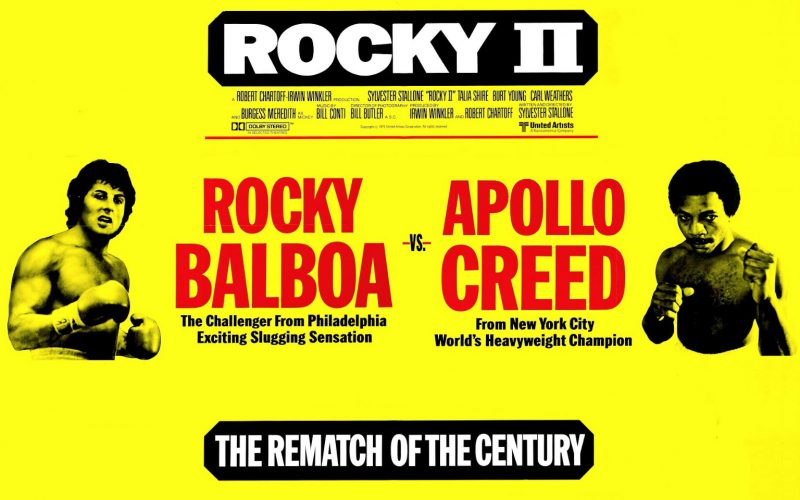Rocky II (1979).
After the surprise runaway success of Rocky it was perhaps a forgone conclusion that a sequel would follow and so it did in the form of 1979’s Rocky II. Once again Sylvester Stallone would find himself writing the script but he now also found himself in the director’s chair. If Rocky had been the one in a million tale of success, then trying to once again score a hit on the scale of the first film would be a long shot, coupled with the responsibility of not sullying the success of the original. This would be Sly’s second time in the director’s chair after Paradise Alley the previous year and he got the gig after the first film’s director John G. Avildsen had passed on the project in its early stages as he was deep in pre-production already, having signed on for 1977’s Saturday Night Fever. In a cruel twist of fate, Avildsen was fired three weeks into principal photography on the movie after a dispute with producer Robert Stigwood. He was replaced by John Badham and ironically Stallone would go on to direct its less well received sequel, 1983’s Staying Alive.
With the tale of the underdog now fully ingrained into the audience’s hearts and minds, this sequel to the tale of the Southpaw fighter’s rise to redemption and glory would initially concentrate on what happens after his fifteen minutes of fame. Stallone immediately grabs the viewer’s attention by allowing the film to open with a recap of the big fight from the original movie, showcasing the grandstand punches that each combatant has thrown and subsequently been forced to withstand and the damage sustained as a result. It’s a great insight that allowed the audience to be shown a side to the fighter’s tale that many would fail to even think about after witnessing such a duel, the aftermath.
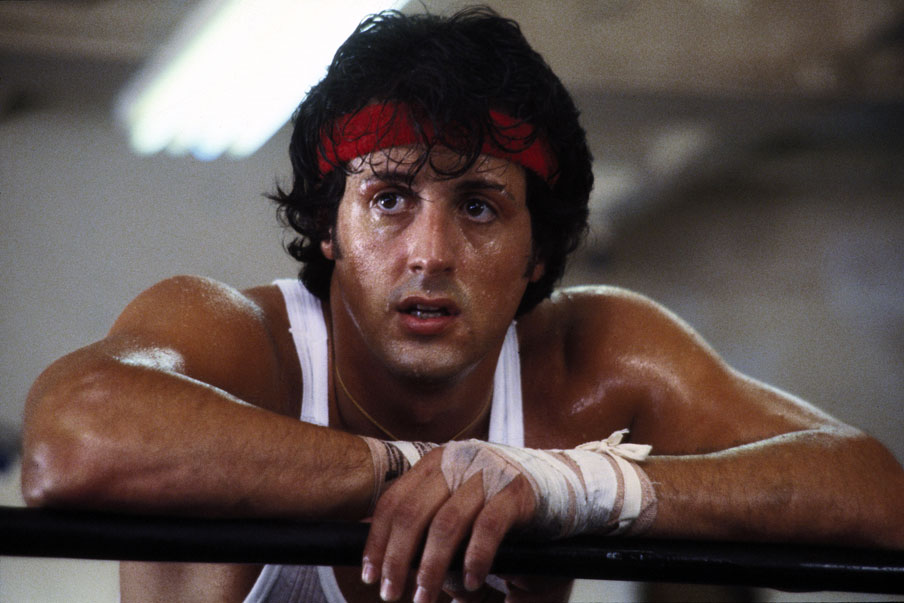
For a fighter like Rocky Balboa to find himself suddenly thrust into the limelight would be a dream for many a struggling pugilist, but to then find himself scoring so much success during the battle would be the stuff of legend. And yet, we now find Rocky in a hospital bed. Devoid of strength and the desire to battle. His eyesight suffering from the barrage of blows that came his way. Of course, there’s also the story of a seemingly unbeatable champion who now lays in a similar fashion further down the hospital corridor. A man who is used to the extreme highs and accolades that have previously come to him through victory. An ego as bruised as his facial features and a man who is on a quest for revenge, to right the wrongs of his previous complacence in the lead up to the original battle. For Balboa, initially at least, it’s enough that he’s achieved his aim of going the distance with Creed, but for the battered victor in Creed, a recorded win will never be enough. He will stop at nothing to put the condescension of the baying public straight, to prove that he is indeed the greatest fighter to walk the earth.
The marvellous contrast between the two fighters is demonstrated as they are both wheel-chaired into the hospital separately, only to find themselves stuck in the middle of a huge press filled melee. Balboa is satisfied with his earlier efforts in the fight, whereas Creed immediately begins to rant at Balboa about how lucky he was in the fight. Although the champion is still showboating to the press and cameras present, his tone has changed completely. Gone is the wry smile and the knowing wink. His voice now conveys anger and he believes that his underestimation of Balboa is the only factor that caused the bout to be so desperately close. Although Creed has come away with a split points decision, this will never be enough for him. No fighter has ever lasted the distance with him before, let alone been so close to handing him his first defeat. Rocky on the other hand is, on the surface at least, happy just to have finally achieved his fleeting success and unlike many who have been suddenly thrust into the spotlight, he’s confident that he’ be content with his achievements, with no immediate desire to fight Creed again.
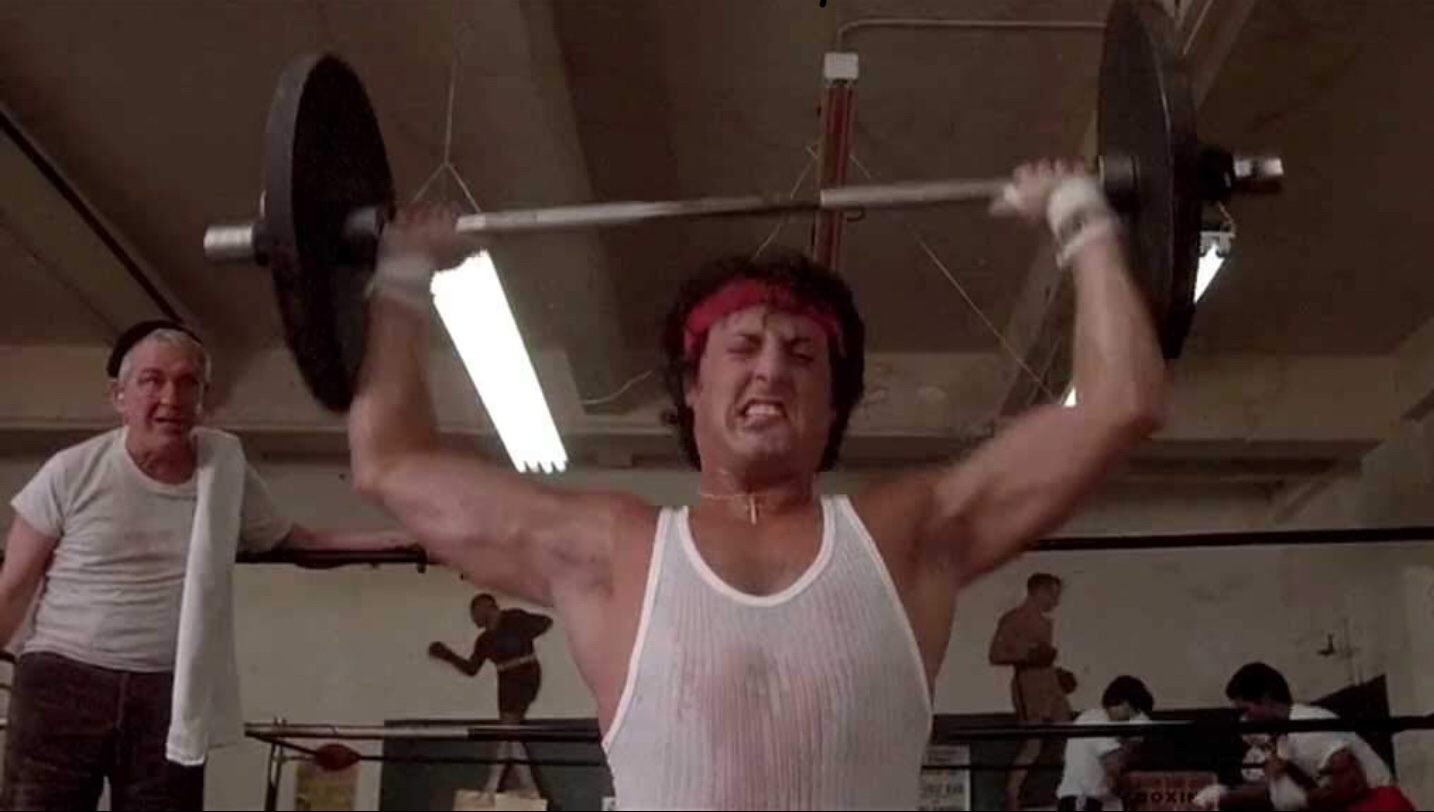
Whilst the Rocky saga would go off in a far glossier, action film-type direction after this sequel, Stallone still manages to maintain the integrity and drive of the original movie with this continuing story of the fighter to which he owes so much to. Allowing this sequel to showcase to his audience the fleeting side of fame that he had somewhat experienced himself after the monumental success of the first film, with cinema goers failing to rush to the box office in the same way for his two follow up films Paradise Alley and F.I.S.T. which were sandwiched between the first and second Rocky instalments. Rocky II isn’t afraid to show a darker edge of one man’s expectations for life not panning out the way he thought it would. As with some of the ensuing sequels, it’s not hard to imagine that Stallone takes inspiration from his own personal life. Much in the same way that the original mirrored his underdog success, this movie parallels his desire to continue to build on the momentum that he’d previously achieved against all the odds. For Stallone’s character though, the question is not only how he’ll ever be able to return to a normal way of life having unexpectedly achieved so much in the Creed fight, but also if the circumstances of his life will ever allow him too.
To essentially continue the story of the Southpaw slugger, Stallone would need to showcase a different side to the character. A man who once found a solace in his failures, who now knows that he’s capable of achieving so much more and as much as he tries to lie to himself that he’s fine, life will continually push him back towards the life of a fighter. It’s as if the Gods of circumstance have already decided that this is his only path. Whilst in the original film, Rocky finds himself with nothing to lose and everything to gain, this second film will find Balboa needing to fight once again to save not only himself but his family from returning to the nothingness that he originally found himself languishing in. Balboa’s initial spending spree aside, he now has a pregnant wife and a mortgage to pay. Rocky has little other option but to put the gloves back on as the narrative shows us how all roads will eventually lead him back to his profession.
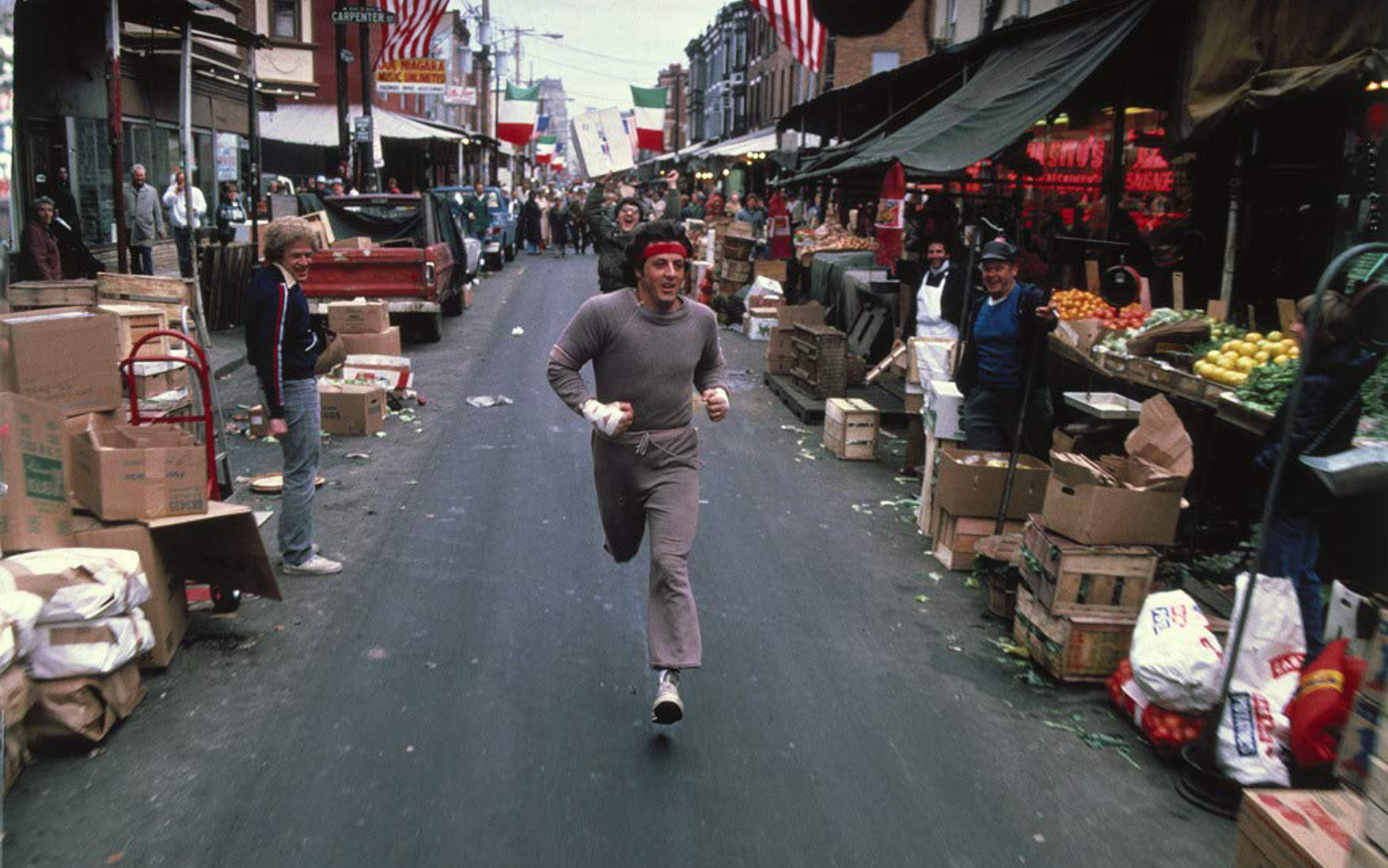
His attempts to earn money from his newfound celebrity status fail spectacularly with a doomed advertising campaign, due to his inability to read the cue cards and shows us an early indication of a man devoid of any other viable paths to success. Much to his embarrassment, he can barely read and in a massive show of support, Adrian will be required to teach him. Once again showing how much she’s willing to stand by him in any way and keep him away from the dangers of fighting again. With this avenue now blocked, Balboa finds himself almost immediately slipping back into normality, finding work at the meat packing factory where he once trained and is now required to settle into the normal existence of punching the clock, rather than punching the slabs of beef to earn his pay. Again, this road is proven to be another dead end when he quickly finds himself surplus to requirements and laid off. With no other option, he is then forced to sink even lower, carrying the overflowing spit buckets of Mickey’s Gym. Looked upon with disappointment by the younger, fresher fighters, whilst all the while still feeling the wrath of an unforgiving Apollo Creed who stalks him mercilessly throughout the media, labelling him a coward who simply got lucky.
Creed is again the antagonist rather than the villain of the piece and we are shown a man who is incessant on proving his worth as a champion, just as much as Balboa will eventually grow in his need to succeed him. As Rocky was so quick to point out to Adrian on their first date, the reason that he became a fighter was because he couldn’t sing or dance. Life has only presented him with one clear talent, the use of his fists and Balboa’s fate is now chiselled in stone. He must fight again and now in the knowledge that he belongs at the highest level of championship prize fighting, simply going the distance will not be enough for him. Before the first fight, Rocky himself admits that he feels a fraud. That he isn’t a worthy challenger, yet now he knows that he is capable of so much more. The ever-repeating thought that he could actually defeat Creed and actually win “Sport’s Richest Prize”, is like a siren’s song drawing him back to the squared circle. He is now so much more than a bit-player in the theatre of blood, sweat and tears, he is now a more self-assured fighter in his belief that he can become the main player on the stage.
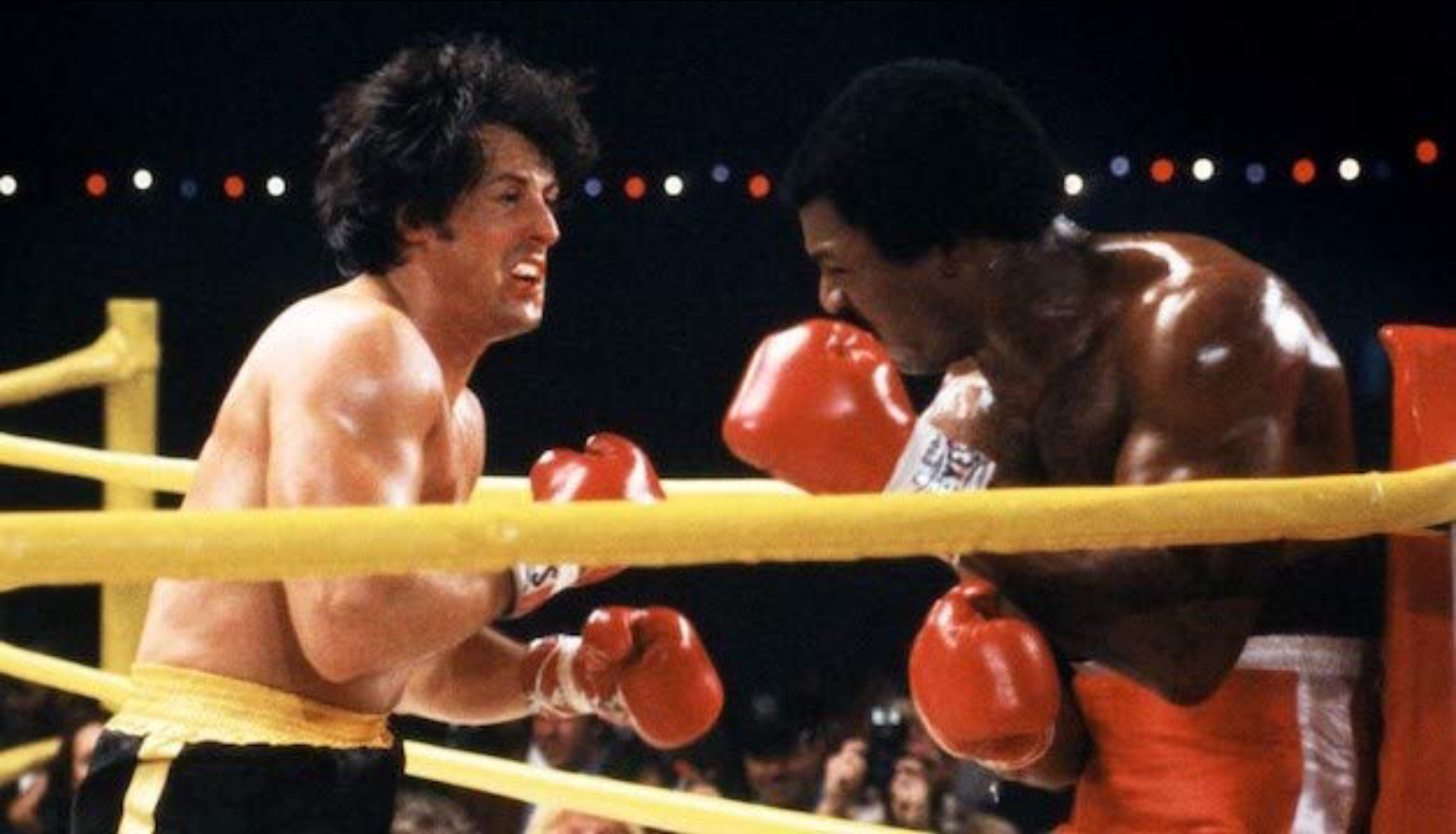
As would become a recurring theme in the series, Rocky’s training involves a change of tactics to achieve the victory. The masterplan being that Mick now trains him to fight from the orthodox stance of a right-handed fighter, as opposed to that of the southpaw (left handed) style that Balboa has always used. In reality, this was again another bit of on-the-fly-thinking on Stallone’s part, when a torn pectoral muscle sustained in his pre-filming training for the role meant that he struggled to fight effectively from the left-handed stance. Fighting in the orthodox style would mean that he wouldn’t be required to throw as many right hands as the jabbing hand he used now would be his left . As with each of the proceeding films, Stallone’s physique continued to grow and define in its sculpture, almost in a parallel with the character’s growth. Sly knew that himself and stated that he had to train harder for each successive film, which in turn would lend itself to the photosynthesis-like nature of the journey that Rocky finds himself travelling throughout the movie series, growing in the spotlight and withering in the shade.
To add to the underdog feeling that had now started to diminish within the audience’s expectations after the first fight, Balboa is again shown to be fighting against the odds when Adrian falls into a coma during child birth after arguing with Paulie, who loudly remonstrates her for not supporting her husband during his initial training. This masterstroke of Stallone’s writing means that the audience will once again side with Rocky’s uphill struggle, as he’s given even less time to train for the rematch, instead being forced to sit at his ailing wife’s bedside in vigil. Reading to her, as if to demonstrate to her how much he needs her and how much she has done for him in the short space of time that they’ve been together, once again recapturing the child like quality of their love as displayed in the first film. Thankfully all is well as his wife awakens and with her whispered commandment to win, we’re back in business and in what would become a recurring theme throughout the next two sequels we’re treated to a more spectacular training montage than the previous film. This is where perhaps we are given a brief glimpse of what the future held for the series as Rocky finds himself leading a band of cheering children like a pugilistic Pied Piper on his run past the various Philadelphian landmarks to the rousing score, once again provided by Bill Conti who managed to update his original theme by mixing in a newly written track which was fittingly entitled “Redemption”.
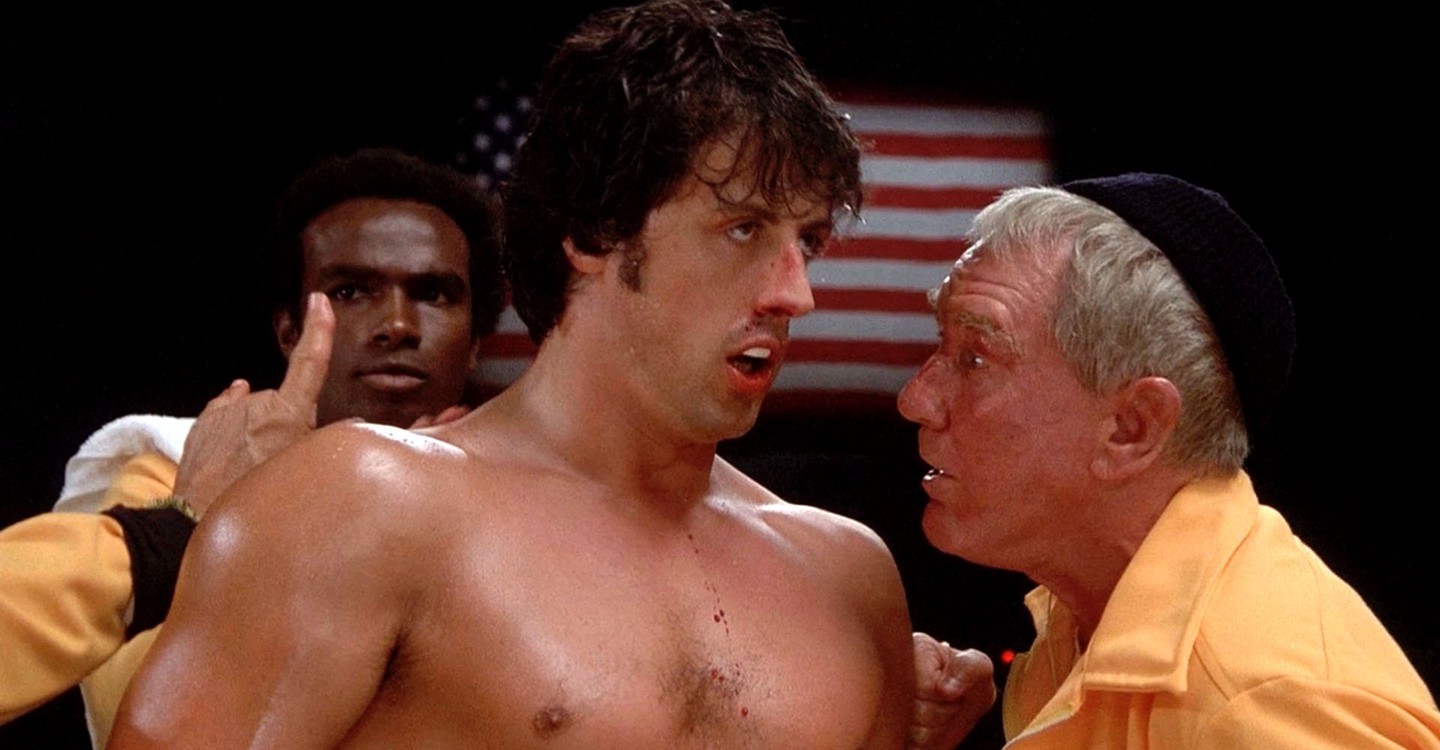
The fight itself again follows the trend of upping the ante over its predecessor with a longer running time. Many tend to forget that a lot of the first fight is essentially missed out, by showing the ring card girls simply displaying the card to indicate the oncoming of the following round and demonstrate the passing of time. This fight lends more to the spectacle soon to come in the following two films and a lot more of the battle is presented this time around. Balboa as the now familiar tradition dictates, loses the early stages of the fight with his new right-handed approach, but as he slowly but surely edges back into the fight, refusing to switch back to his natural Southpaw fighting style, he manages to gain ground on Creed, even telling his corner that he will not use tricks to win the bout by switching back to Southpaw. His natural inner determination and sheer gritted fortitude will eventually take the fight out of Creed. He continues to press forward before his final blow lands upon the soon to be defeated champion with such force that it sends both men to the canvas. Struggling to beat the count, both fighters are at the mercy of what little energy they have left to raise themselves back to their feet and beat the count.
Ok, in reality, this wouldn’t be the case. Creed went down from the punch, Balboa would win the fight even if he remained on the canvas with the bloodied now ex-champion, but let’s not let the real-world rules of boxing spoil this marvellous finale. I’ve heard many say that this film is essentially a remake of the original, but I would argue that this is not strictly the case. It’s more a progression of the character’s story arc and let’s be completely honest, we all wanted to see Rocky win this time around didn’t we.
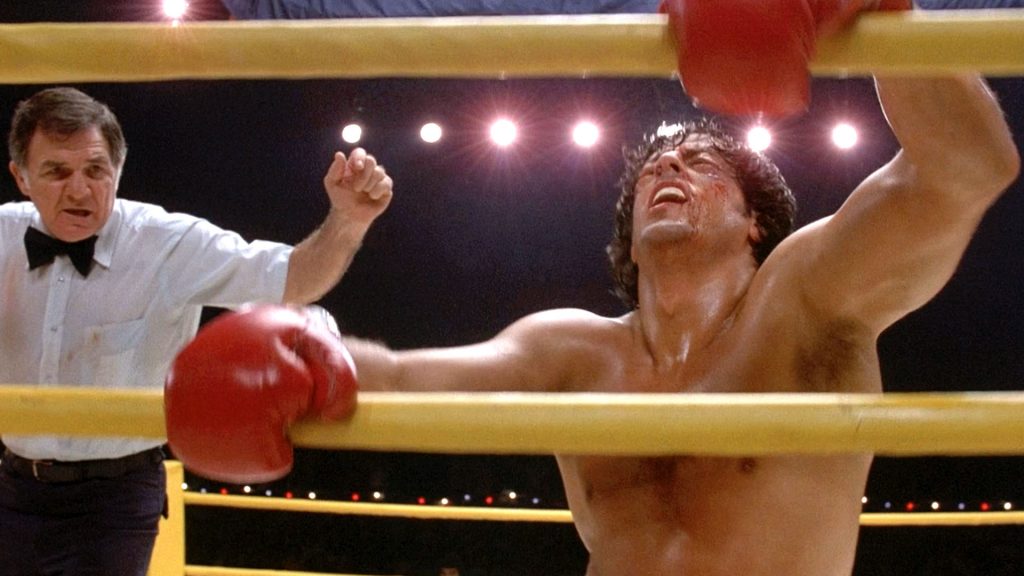
“Yo Adrian! We did it!”
Rocky Balboa was now not just a plucky underdog, he was the Heavyweight Champion Of The World and he had fully realised his potential for success, something that secretly we all know that we have within us in whatever form of victory we have our hearts set on. Many a person would allow themselves to let their failures distract them from their path, as life grinds them down, much in the way that we first saw Rocky’s life heading initially in the original film. But for every overnight sensation, there is the persistent trier, someone who never gives up and no matter how long it takes, their lives will eventually change overnight as they finally achieve their goal thanks to years of secret toil in the shadows. Of course, there would be a third and (supposedly at the time) final chapter to this story with 1982’s Rocky III. But for now, Balboa had achieved his dream and upset the odds once again, giving his audience the ultimate feel-good film without tarnishing the reputation of the original, something that far too few sequels can hope to claim.
Film ‘89 Verdict – 9/10

